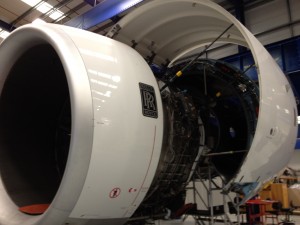Yesterday I had a brilliant visit to the Rolls Royce aero engines plant in Derby. Factory visits are always fascinating, and this was particularly so. It’s of course a superb company, and its qualities manifested themselves in all kinds of ways: the focus of the conversations on the long term, on 2020 and 2025; the superb apprenticeship and management training programmes, now being provided for companies in the supply chain as well as Rolls Royce itself; the fact that everyone I spoke to from apprentices to top execs talked about their bit of the business in a way that was consistent and fitted into the same overall strategic picture. Above all, of course, the engines. Amazing technology, so complex, highly dependent on research, long-term investment, IP and skilled people. It was interesting to hear the emphasis on ideas and skills, and on services provided with the product, in a manufacturing company.

A Rolls Royce engine – one of the big ones
There have been a couple of excellent books recently on the areas of strength in UK manufacturing – [amazon_link id=”0349123780″ target=”_blank” ]Made in Britain[/amazon_link] by Evan Davis and [amazon_link id=”0300117779″ target=”_blank” ]The New Industrial Revolution[/amazon_link] by Peter Marsh (the latter is speaking at the Festival of Economics in Bristol on 24 November). (See also the excellent TV programmes by Evan D, Built in Britain, which turned to infrastructure.) Given that I also recently heard about the potential for a significant revival of the Lancashire textiles industry (to which I have an emotional attachment), I do tend to agree with these two authors in believing that our manufacturing industry still has areas of strength.
[amazon_image id=”0300117779″ link=”true” target=”_blank” size=”medium” ]The New Industrial Revolution: Consumers, Globalization and the End of Mass Production[/amazon_image]
However, I think there are two big worries. One is about investment in skills: we have had far too few industrial apprenticeships for too long, and although this is improving slowly, it will take many years to rebuild a sufficiently large skill base. There is also still too much of a presumption that university is better than an apprenticeship – I would disagree with this priority on academic or cognitive skills.
The second is the gap between the superb big companies like Rolls Royce and small, albeit vigorous, manufacturers. The UK needs the middle rank of companies that can feasibly supply the biggest ones – the small ones just can’t deliver on an appropriate scale, can’t afford to invest either in basic R&D or even product development, can’t take on more than one or two apprentices. A lasting manufacturing revival will need to look again at the long-standing barriers that are stopping successful small companies from growing above a certain size.
